- Home
- Kazuo Ishiguro
When We Were Orphans
When We Were Orphans Read online
CONTENTS
TITLE PAGE
DEDICATION
PART ONE
CHAPTER 1
CHAPTER 2
CHAPTER 3
PART TWO
CHAPTER 4
CHAPTER 5
CHAPTER 6
CHAPTER 7
CHAPTER 8
CHAPTER 9
PART THREE
CHAPTER 10
CHAPTER 11
PART FOUR
CHAPTER 12
CHAPTER 13
PART FIVE
CHAPTER 14
CHAPTER 15
PART SIX
CHAPTER 16
CHAPTER 17
CHAPTER 18
CHAPTER 19
CHAPTER 20
CHAPTER 21
CHAPTER 22
PART SEVEN
CHAPTER 23
A NOTE ABOUT THE AUTHOR
ALSO BY KAZUO ISHIGURO
COPYRIGHT
TO LORNA AND NAOMI
PART ONE
LONDON, 24TH JULY 1930
CHAPTER 1
IT WAS THE SUMMER of 1923, the summer I came down from Cambridge, when despite my aunt’s wishes that I return to Shropshire, I decided my future lay in the capital and took up a small flat at Number 14b Bedford Gardens in Kensington. I remember it now as the most wonderful of summers. After years of being surrounded by fellows, both at school and at Cambridge, I took great pleasure in my own company. I enjoyed the London parks, the quiet of the Reading Room at the British Museum; I indulged entire afternoons strolling the streets of Kensington, outlining to myself plans for my future, pausing once in a while to admire how here in England, even in the midst of such a great city, creepers and ivy are to be found clinging to the fronts of fine houses.
It was on one such leisurely walk that I encountered quite by chance an old schoolfriend, James Osbourne, and discovering him to be a neighbour, suggested he call on me when he was next passing. Although at that point I had yet to receive a single visitor in my rooms, I issued my invitation with confidence, having chosen the premises with some care. The rent was not high, but my landlady had furnished the place in a tasteful manner that evoked an unhurried Victorian past; the drawing room, which received plenty of sun throughout the first half of the day, contained an ageing sofa as well as two snug armchairs, an antique sideboard and an oak bookcase filled with crumbling encyclopaedias—all of which I was convinced would win the approval of any visitor. Moreover, almost immediately upon taking the rooms, I had walked over to Knightsbridge and acquired there a Queen Anne tea service, several packets of fine teas, and a large tin of biscuits. So when Osbourne did happen along one morning a few days later, I was able to serve out the refreshments with an assurance that never once permitted him to suppose he was my first guest.
For the first fifteen minutes or so, Osbourne moved restlessly around my drawing room, complimenting me on the premises, examining this and that, looking regularly out of the windows to exclaim at whatever was going on below. Eventually he flopped down into the sofa, and we were able to exchange news—our own and that of old schoolfriends. I remember we spent a little time discussing the activities of the workers’ unions, before embarking on a long and enjoyable debate on German philosophy, which enabled us to display to one another the intellectual prowess we each had gained at our respective universities. Then Osbourne rose and began his pacing again, pronouncing as he did so upon his various plans for the future.
“I’ve a mind to go into publishing, you know. Newspapers, magazines, that sort of thing. In fact, I fancy writing a column myself. About politics, social issues. That is, as I say, if I decide not to go into politics myself. I say, Banks, do you really have no idea what you want to do? Look, it’s all out there for us”—he indicated the window—“Surely you have some plans.”
“I suppose so,” I said, smiling. “I have one or two things in mind. I’ll let you know in good time.”
“What have you got up your sleeve? Come on, out with it! I’ll get it out of you yet!”
But I revealed nothing to him, and before long got him arguing again about philosophy or poetry or some such thing. Then around noon, Osbourne suddenly remembered a lunch appointment in Piccadilly and began to gather up his belongings. It was as he was leaving, he turned at the door, saying:
“Look, old chap, I meant to say to you. I’m going along tonight to a bash. It’s in honour of Leonard Evershott. The tycoon, you know. An uncle of mine’s giving it. Rather short notice, but I wondered if you’d care to come along. I’m quite serious. I’d been meaning to pop over to you long ago, just never got round to it. It’ll be at the Charingworth.”
When I did not reply immediately, he took a step towards me and said:
“I thought of you because I was remembering. I was remembering how you always used to quiz me about my being ‘well connected.’ Oh, come on! Don’t pretend you’ve forgotten! You used to interrogate me mercilessly. ‘Well connected? Just what does that mean, well connected?’ Well, I thought, here’s a chance for old Banks to see ‘well connected’ for himself.” Then he shook his head, as though at a memory, saying: “My goodness, you were such an odd bird at school.”
I believe it was at this point I finally assented to his suggestion for the evening—an evening which, as I shall explain, was to prove far more significant than I could then have imagined—and showed him out without betraying in any part the resentment I was feeling at these last words of his.
My annoyance only grew once I had sat down again. I had, as it happened, guessed immediately what Osbourne had been referring to. The fact was, throughout school, I had heard it said repeatedly of Osbourne that he was “well connected.” It was a phrase that came up unfailingly when people talked of him, and I believe I too used it about him whenever it seemed called for. It was indeed a concept that fascinated me, this notion that he was in some mysterious way connected to various of the higher walks of life, even though he looked and behaved no differently from the rest of us. However, I cannot imagine I “mercilessly interrogated” him as he had claimed. It is true the subject was something I thought about a lot when I was fourteen or fifteen, but Osbourne and I had not been especially close at school and, as far as I remember, I only once brought it up with him personally.
It was on a foggy autumn morning, and the two of us had been sitting on a low wall outside a country inn. My guess is that we would have been in the Fifth by then. We had been appointed as markers for a cross-country run, and were waiting for the runners to emerge from the fog across a nearby field so that we could point them in the correct direction down a muddy lane. We were not expecting the runners for some time yet, and so had been idly chatting. It was on this occasion, I am sure, that I asked Osbourne about his “well connectedness.” Osbourne, who for all his exuberance, had a modest nature, tried to change the subject. But I persisted until he said eventually:
“Oh, do knock it off, Banks. It’s all just nonsense, there’s nothing to analyse. One simply knows people. One has parents, uncles, family friends. I don’t know what there is to be so puzzled about.” Then quickly realising what he had said, he had turned and touched my arm. “Dreadfully sorry, old fellow. That was awfully tactless of me.”
This faux pas seemed to cause Osbourne much more anguish than it had me. Indeed, it is not impossible it had remained on his conscience for all those years, so that in asking me to accompany him to the Charingworth Club that evening, he was in some way trying to make amends. In any case, as I say, I had not been at all upset that foggy morning by his admittedly careless remark. In fact, it had become a matter of some irritation to me that my schoolfriends, for all their readiness to fall into banter concerning virtually any other
of one’s misfortunes, would observe a great solemnness at the first mention of my parents’ absence. Actually, odd as it may sound, my lack of parents—indeed, of any close kin in England except my aunt in Shropshire—had by then long ceased to be of any great inconvenience to me. As I would often point out to my companions, at a boarding school like ours, we had all learned to get on without parents, and my position was not as unique as all that. Nevertheless, now I look back on it, it seems probable that at least some of my fascination with Osbourne’s “well connectedness” had to do with what I then perceived to be my complete lack of connection with the world beyond St. Dunstan’s. That I would, when the time came, forge such connections for myself and make my way, I had no doubts. But it is possible I believed I would learn from Osbourne something crucial, something of the way such things worked.
But when I said before that Osbourne’s words as he left my flat had somewhat offended me, I was not referring to his raising the matter of my “interrogating” him all those years before. Rather, what I had taken exception to was his casual judgement that I had been “such an odd bird at school.”
In fact, it has always been a puzzle to me that Osbourne should have said such a thing of me that morning, since my own memory is that I blended perfectly into English school life. During even my earliest weeks at St. Dunstan’s, I do not believe I did anything to cause myself embarrassment. On my very first day, for instance, I recall observing a mannerism many of the boys adopted when standing and talking—of tucking the right hand into a waistcoat pocket and moving the left shoulder up and down in a kind of shrug to underline certain of their remarks. I distinctly remember reproducing this mannerism on that same first day with sufficient expertise that not a single of my fellows noticed anything odd or thought to make fun.
In much the same bold spirit, I rapidly absorbed the other gestures, turns of phrase and exclamations popular among my peers, as well as grasping the deeper mores and etiquettes prevailing in my new surroundings. I certainly realised quickly enough that it would not do for me to indulge openly—as I had been doing routinely in Shanghai—my ideas on crime and its detection. So much so that even when during my third year there was a series of thefts, and the entire school was enjoying playing at detectives, I carefully refrained from joining in in all but a nominal way. And it was, no doubt, some remnant of this same policy that caused me to reveal so little of my “plans” to Osbourne that morning he called on me.
However, for all my caution, I can bring to mind at least two instances from school that suggest I must, at least occasionally, have lowered my guard sufficiently to give some idea of my ambitions. I was unable even at the time to account for these incidents, and am no closer to doing so today.
The earlier of these occurred on the occasion of my fourteenth birthday. My two good friends of that time, Robert Thornton-Browne and Russell Stanton, had taken me to a tea-shop in the village and we had been enjoying ourselves over scones and cream cakes. It was a rainy Saturday afternoon and all the other tables were occupied. This meant that every few minutes more rain-soaked villagers would come in, look around, and throw disapproving looks in our direction as though we should immediately vacate our table for them. But Mrs. Jordan, the proprietress, had always been welcoming towards us, and on that afternoon of my birthday, we felt we had every right to be occupying the choice table beside the bay window with its view of the village square. I do not recall much of what we talked about that day; but once we had eaten our fill, my two companions exchanged looks, then Thornton-Browne reached down into his satchel and presented to me a gift-wrapped package.
As I set about opening it, I quickly realised the package had been wrapped in numerous sheets, and my friends would laugh noisily each time I removed one layer, only to be confronted by another. All the signs, then, were that I would find some joke item at the end of it all. What I did eventually uncover was a weathered leather case, and when I undid the tiny catch and raised the lid, a magnifying glass.
I have it here now before me. Its appearance has changed little over the years; it was on that afternoon already well travelled. I remember noting this, along with the fact that it was very powerful, surprisingly weighty, and that the ivory handle was chipped all down one side. I did not notice until later—one needs a second magnifying glass to read the engraving—that it was manufactured in Zurich in 1887.
My first reaction to this gift was one of huge excitement. I snatched it up, brushing aside the bundles of wrapping covering the table surface—I suspect in my enthusiasm I caused a few sheets to flutter to the floor—and began immediately to test it on some specks of butter smeared on the tablecloth. I became so absorbed that I was only vaguely aware of my friends laughing in that exaggerated way that signifies a joke at one’s expense. By the time I looked up, finally self-conscious, they had both fallen into an uncertain silence. It was then that Thornton-Browne gave a half-hearted snigger, saying:
“We thought since you’re going to be a detective, you’d be needing one of these.”
At this point, I quickly recovered my wits and made a show of pretending the whole thing had been an amusing jest. But by then, I fancy, my two friends were themselves confused about their intentions, and for the remainder of our time at the tea-shop, we never quite regained our former comfortable mood.
As I say, I have the magnifying glass here now in front of me. I used it when investigating the Mannering case; I used it again, most recently, during the Trevor Richardson affair. A magnifying glass may not be quite the crucial piece of equipment of popular myth, but it remains a useful tool for the gathering of certain sorts of evidence, and I fancy I will, for some time yet, carry about with me my birthday gift from Robert Thornton-Browne and Russell Stanton. Gazing at it now, this thought occurs to me: if my companions’ intention was indeed to tease me, well then, the joke is now very much on them. But sadly, I have no way now of ascertaining what they had in mind, nor indeed how, for all my precautions, they had ever gleaned my secret ambition. Stanton, who had lied about his age in order to volunteer, was killed in the third battle of Ypres. Thornton-Browne, I heard, died of tuberculosis two years ago. In any case, both boys left St. Dunstan’s in the fifth year and I had long since lost touch with them by the time I heard of their deaths. I still remember, though, how disappointed I was when Thornton-Browne left the school; he had been the one real friend I had made since arriving in England, and I missed him much throughout the latter part of my career at St. Dunstan’s.
The second of these two instances that comes to mind occurred a few years later—in the Lower Sixth—but my recollection of it is not as detailed. In fact, I cannot remember at all what came before and after this particular moment. What I have is a memory of walking into a classroom—Room 15 in the Old Priory—where the sun was pouring through the narrow cloister windows in shafts, revealing the dust hanging in the air. The master had yet to arrive, but I must have come in slightly late, for I remember finding my classmates already sitting about in clusters on the desk-tops, benches and window ledges. I was about to join one such group of five or six boys, when their faces all turned to me and I saw immediately that they had been discussing me. Then, before I could say anything, one of the group, Roger Brenthurst, pointed towards me and remarked:
“But surely he’s rather too short to be a Sherlock.”
A few of them laughed, not particularly unkindly, and that, as far as I recall, was all there was to it. I never heard any further talk concerning my aspirations to be a “Sherlock,” but for some time afterwards I had a niggling concern that my secret had got out and become a topic for discussion behind my back.
Incidentally, the need to exercise caution around this whole topic of my ambitions had been impressed upon me before I ever arrived at St. Dunstan’s. For I had spent much of my first few weeks in England wandering about the common near my aunt’s cottage in Shropshire, performing amidst the damp ferns the various detective scenarios Akira and I had evolved together in Shangh
ai. Of course, now that I was alone, I was obliged to take on all his roles as well; moreover, aware as I was that I could be seen from the cottage, I had had the sense to enact these dramas with restrained movements, muttering our lines under my breath—in marked contrast to the uninhibited manner in which Akira and I had been accustomed to carry on.
Such precautions, however, had proved inadequate. For one morning I had overheard from the little attic room I had been given, my aunt talking with some friends down in the drawing room. It was the sudden lowering of their voices that had first aroused my curiosity, and I soon found myself creeping out on to the landing and leaning over the rail.
“He’s gone for hours,” I could hear her saying. “It’s hardly healthy, a boy his age, sunk in his own world like that. He has to start looking ahead.”
“But it’s only to be expected, surely,” someone said. “After everything that’s happened to him.”
“He has nothing at all to gain by brooding,” my aunt said. “He’s been well provided for, and in that sense he’s been lucky. It’s time he looked forward. I mean to put a stop to all this introspection.”
From that day on I ceased to go to the common, and in general, took steps to avoid any further displays of “introspection.” But I was then still very young, and at nights, lying in that attic room, listening to the creak of the boards as my aunt moved about the cottage winding her clocks and seeing to her cats, I would often enact again, in my imagination, all our old detective dramas in just the way Akira and I had always done.
But let me return to that summer’s day Osbourne called at my Kensington flat. I do not wish to imply that this remark of his, about my being “an odd bird,” preoccupied me for more than a few moments. In fact, I went out myself, not long after Osbourne, in rather good spirits, and was soon to be found in St. James’s Park, strolling about the flower beds, growing ever more eager for the evening ahead.
Thinking again of that afternoon, it strikes me I had every right to feel a little nervous, and it is entirely typical of the foolish arrogance that carried me through those early London days that I did not. I was aware, of course, that this particular evening would be on a different level from anything I had ever attended at university; that I might well, moreover, encounter points of custom as yet unfamiliar to me. But I felt sure I would, with my usual vigilance, negotiate any such difficulties, and in general acquit myself well. My concerns as I drifted around the park were of a quite different order. When Osbourne had talked of “well-connected” guests, I had immediately assumed these to include at least a few of the leading detectives of the day. I fancy, then, that I spent a lot of my time that afternoon working out just what I would say should I be introduced to Matlock Stevenson, or perhaps even to Professor Charleville. I rehearsed over and over how I would—modestly, but with a certain dignity—outline my ambitions; and I pictured to myself one or the other of them taking a fatherly interest in me, offering all kinds of advice and insisting I come to him for guidance in the future.

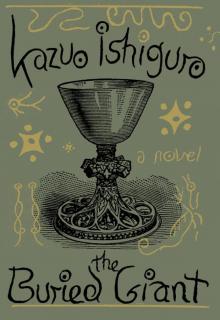 The Buried Giant
The Buried Giant Never Let Me Go
Never Let Me Go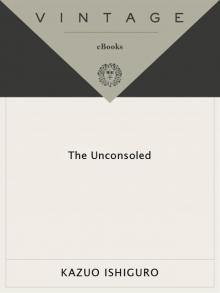 The Unconsoled
The Unconsoled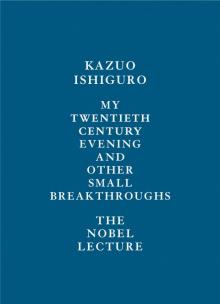 My Twentieth Century Evening and Other Small Breakthroughs: The Nobel Lecture
My Twentieth Century Evening and Other Small Breakthroughs: The Nobel Lecture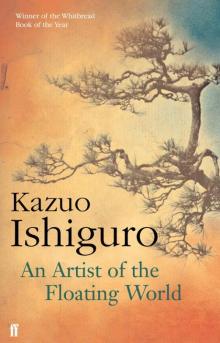 An Artist of the Floating World
An Artist of the Floating World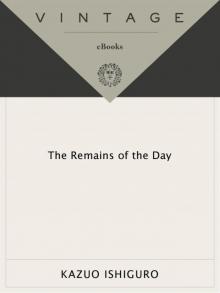 The Remains of the Day
The Remains of the Day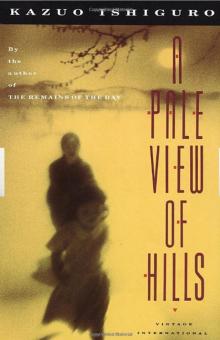 A Pale View of Hills
A Pale View of Hills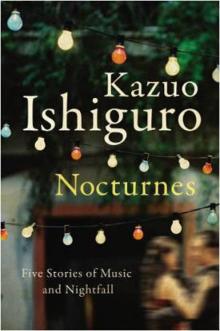 Nocturnes: Five Stories of Music and Nightfall
Nocturnes: Five Stories of Music and Nightfall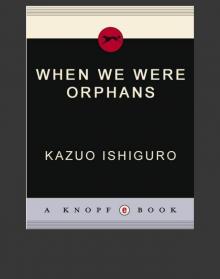 When We Were Orphans
When We Were Orphans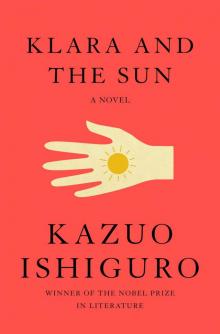 Klara and the Sun
Klara and the Sun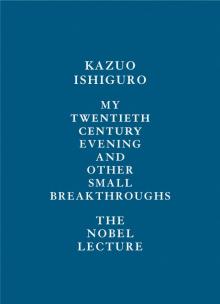 The Nobel Lecture 2017
The Nobel Lecture 2017